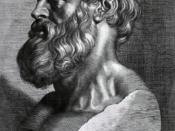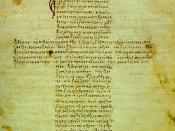Over the span of history, numerous civilizations have tried to obliterate pain. Various methods have been applied, some with success, others with failure. However, from Ancient China to Ancient Greece, the basic belief that a higher being was responsible for ailments remained stable. People mistakenly believed that illnesses were caused by superstitions, a disfavor of the gods, or possession of evil spirits. People believed that man was not responsible for medicine and therefore, had no power to cure illnesses. These early people believed that ailments were caused by forces out of mans reach. These diseases were therefore "prevented and treated by magic directed against supernatural forces" (Haggard 10). These beliefs gave rise to the shaman and medicine man; spiritual men who tried to rid the patient of demons through herbal concoctions. This way of thinking was changed in the 5th century during the Dawn of Hippocrates, by the Greek physician Hippocrates.
Hippocrates, known as the "Father of Medicine," was born on the island of Cos, Greek in 460 BC. He is regarded as the founder of medicine and argued against the theory that illness was caused by supernatural forces, thereby freeing ancient medicine from superstition and shifting it towards science.
"Under his influence, the shackles of mysticism, which had bound medicine for so long, were at last cast off. With Hippocrates, medicine entered the stage of Reason based upon observation, and for the first time it acknowledged the unknown. By...careful, painstaking observation and inquiry, the physician became a servant of nature- a doctor instead of a sorcerer" ("History of Medicine" 3).
Hippocrates taught physicians to base their knowledge on their careful observation of their patients, and by seeing how they responded to certain medications (Martin 145-146). He believed that by studying enough patients, a doctor could predict the course of...


